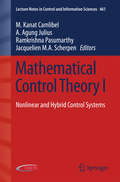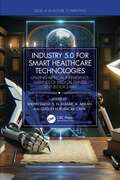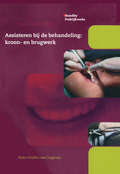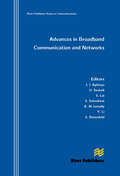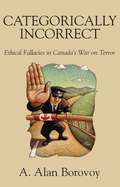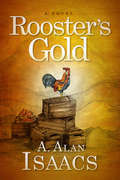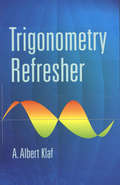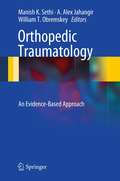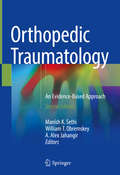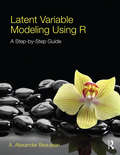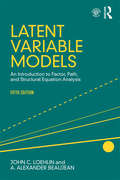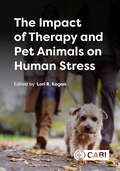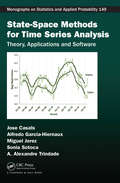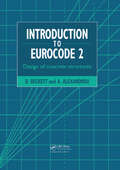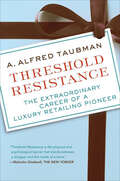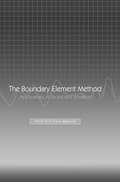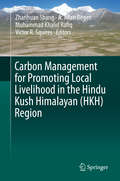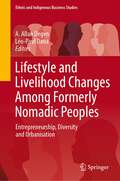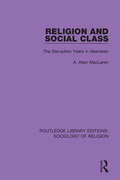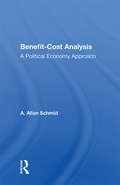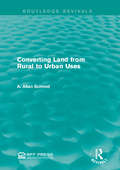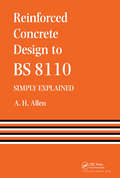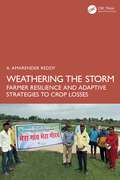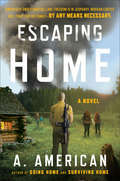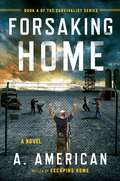- Table View
- List View
Mathematical Control Theory I
by Jacquelien M.A. Scherpen M. Kanat Camlibel A. Agung Julius Ramkrishna PasumarthyThis treatment of modern topics related to mathematical systems theory forms the proceedings of a workshop, Mathematical Systems Theory: From Behaviors to Nonlinear Control, held at the University of Groningen in July 2015. The workshop celebrated the work of Professors Arjan van der Schaft and Harry Trentelman, honouring their 60th Birthdays. The first volume of this two-volume work covers a variety of topics related to nonlinear and hybrid control systems. After giving a detailed account of the state of the art in the related topic, each chapter presents new results and discusses new directions. As such, this volume provides a broad picture of the theory of nonlinear and hybrid control systems for scientists and engineers with an interest in the interdisciplinary field of systems and control theory. The reader will benefit from the expert participants' ideas on exciting new approaches to control and system theory and their predictions of future directions for the subject that were discussed at the workshop.
Industry 5.0 for Smart Healthcare Technologies: Utilizing Artificial Intelligence, Internet of Medical Things and Blockchain (ISSN)
by Sherin Zafar S. N. Kumar A. Ahilan Gulsun Kurubacak CakirIn this book, the role of Artificial Intelligence (AI), Internet of Things (IoT) and Blockchain in smart healthcare is explained through a detailed study of Artificial Neural Network, Fuzzy Set Theory, Intuitionistic Fuzzy Set, Machine Learning and Big Data technology.Industry 5.0 for Smart Healthcare Technologies: Utilizing Artificial Intelligence, Internet of Medical Things and Blockchain focuses on interesting applications of AI, promising advancements in IoT and important findings in Blockchain technology. When applied to smart healthcare technologies, Industry 5.0 offers numerous benefits that can revolutionize the healthcare industry. This book provides readers with insights and tools for enhanced patient care, remote patient monitoring, predictive analytics and early intervention of diseases, seamless data sharing and interoperability, telemedicine and virtual care, and a safer and more secure healthcare ecosystem. The authors examine novel computational algorithms for the processing of medical images, as well as novel algorithms for the processing of biosignals in detection of diseases. This book also explores systems for processing physiological parameters and discusses applications of AI techniques in the broader healthcare industry. The authors also investigate the importance of Augment Reality/Virtual Relatity (AR/VR) in the healthcare sector and examine the futuristic applications of Industry 5.0 in the healthcare sector.This book is intended for researchers and professionals working in interdisciplinary fields of computer engineering/science and healthcare. It will provide them with the tools to enhance diagnostics, optimize treatment plans, and empower patients to actively participate in their healthcare journey.
Assisteren bij de behandeling: kroon- en brugwerk (Standby praktijkreeks)
by A. AkkerVervaardigen van kronen en bruggen is een technisch ingewikkelde behandeling. Voor het slagen van de behandeling, is het van groot belang dat de assistente de tandarts op een goede manier kan bijstaan. Dit deel uit de Standby Praktijkreeks is voor de assistente daarbij een onmisbare steun. In de eerste plaats omdat een goed algemeen overzicht wordt gegeven van de gang van zaken bij deze behandeling. Daarnaast biedt het boek belangrijke tips en trucs voor de behandeling. Tevens wordt de communicatie met de tandtechnicus en de patiënt toegelicht. Met de kennis die dankzij dit boek op deze gebieden wordt opgedaan, zal de tandartsassistente de tandarts beter kunnen ondersteunen en ook moeilijke situaties en problemen veel beter de baas kunnen. Zoals bij praktische onderpen als deze hoort, is de informatie gebaseerd op situaties uit de dagelijkse praktijk. De gepresenteerde casuïstiek en theorie zijn bovendien rijk voorzien van foto"s. Tandartsassistenten (in opleiding), maar ook de tandarts zelf en de mondhygiënisten, kunnen zich zo een uitstekend beeld vormen van alle facetten van de behandeling en de verworven kennis direct in de praktijk toepassen
Advances in Broadband Communication and Networks
by David Johnson David Burton Li Li Homayoun Nikookar Mark Bishop Peter Fischer Evangelos Bekiaris F. Zhang Ming Xu R. J. Evans C. Lin Z. Liu Thomas Magedanz Y. Li J. I. Agbinya O. Sevimli S. Lal S. Selvadurai A. Al-Jumaily S. Reisenfeld Graham I Hooker Ross Hennessey Craig Lobsey Andrew Maclean Andrew D. Hellicar Kieran Greene Greg Hislop Stephen Hanham Nasiha Nikolic Jia Dn Greg P. Timms John D. Bnnton Michael L. Brothers John W. Archer Val Dyadyuka Leigh Stokes B. Yang Y. Mo B. Wicks C. Ta-Minh G. Felic K. Wang P. Nadagonda T. Walsh E. Skafidas Kuan Lun Huang Jinhong Yuan Hajime Suzukia Iain B. Collings George Lam Mark Hedley Jian Andrew Zhang Eu-Suk Shim Jee-Hyun Kim Hyoung-Kyu Song Young-Hwan You J. Renato Nascimento Marius Iulian Corici Fabricio Carvalho de Gouveia Yaw Nkansah-Gyekye Eugene Zilberg Murad Karrar Saroj Lal Budi Thomas Jap Sara Lal Frank Chiang Robin Braun Bashar Ramadanny Ibrahim S. Raada Xiaojing Huang Raad RaadBroadband communications has become the major focus for industry for offering rich multimedia IP services in next generation networks. This book deals with the state-of-the-art and the underlying principles of key technologies which facilitate broadband telecommunications including millimetre wave gigabit Ethernet, terahertz communication, multiple input multiple output (MIMO) technology, orthogonal frequency division multiplex (OFDM), ultra wideband (UWB) and the fourth generation (4G) network technologies. The book illustrates the use of these technologies, including high resolution three-dimensional millimetre wave radar imaging and terahertz imaging techniques. Within the next few years advances in graphic rendering and the application of millimetre wave radar technology will enable high resolution radar surveillance and operators of industrial processes to control their machines and to navigate remotely even in poor visibility environments. The principles and performance of terahertz imaging are also demonstrated in this important book. The performance and success of emerging all-IP networks depend largely on the efficiency of broadband technologies and this book provides the basis for 4G networks and explores key performance measures such as quality of service and handover between distributed networks (mobile and fixed). The book also demonstrates the medical and biomedical applications of broadband wireless communications.
Categorically Incorrect: Ethical Fallacies in Canada's War on Terror
by A. Alan BorovoyIf humanity has learned anything from the horrors of the war against terror, it is that our one hope is democracy. The final goal of our country’s actions at home and abroad is the preservation of democracy. This is the lens through which our policies should be discerned, dissected, and amended.Borovoy argues that Canada has pursued an ethically cockeyed war against terror. We have been needlessly dovish abroad and excessively hawkish at home. In order to use military force abroad, the government fussed over the need for UN approval. At home, however, there are no such restraints: without even asking a court, the government may effectively deprive certain perople of the right to make a living. As the author summrizes: "Internationally, key fallacies stem from an undue respect for a rule of law that does not exist. Domestically, key fallacies stem from an undue neglect of a rule of law that does exist."
Rooster's Gold: A Novel
by A. Alan IsaacsRe-experience historical fact as it is woven into the fictional fabric of the Hawkins family with Xander Hawkins, an extremely wealthy man from Tennessee, who engages a New York lawyer to create a Trust Fund to provide for the continuation of his dream: the encouragement, education, and care of orphans.A. Alan Isaacs invites readers to sit in Xander&’s study alongside the lawyer as he listens to stories about how the Hawkins family discovered a love for orphans and an unimaginable treasure! Over several days, the lawyer learns how more than 200 years of &‘Journaling&’ from Xander&’s ancestors continues to influence his approach to life. Along the way, readers can snap pictures of QR Codes embedded throughout Rooster&’s Gold to effortlessly connect the written word to an internet-based resource. Readers can also fact-check Xander&’s stories as his relatives encounter several of history&’s heroes, such as Davy Crockett, Theodore Roosevelt and his Rough Riders, and many more!After returning from the Spanish-American war, Rooster&’s son learns that orphaned and abandoned children are being put on trains in New York City and &‘whistle-stopped&’ across the United States to live and work on farms to produce crops for the country&’s exploding population. Witness how the stories of these Orphan Train Children profoundly impact the Hawkins&’ family—and the New York lawyer.
Trigonometry Refresher (Dover Books On Mathematics Ser.)
by A. Albert KlafThis classic text encompasses the most important aspects of plane and spherical trigonometry in a question-and-answer format. Its 913 specially selected questions appear with detailed answers that help readers refresh their trigonometry skills or clear up difficulties in particular areas. Questions and answers in the first part discuss plane trigonometry, proceeding to examinations of special problems in navigation, surveying, elasticity, architecture, and various fields of engineering. The final section explores spherical trigonometry and the solution of spherical triangles, with applications to terrestrial and astronomical problems. Readers can test their progress with 1,738 problems, many of which feature solutions. 1946 edition. 494 figures.
Orthopedic Traumatology
by William T. Obremskey Manish K. Sethi A. Alex JahangirPhysicians are under increasing pressure to provide quality health care in the most cost-effective way possible. The escalating costs of orthopedic care are driving the need to base clinical decision making on evidence-based data that will help physicians provide optimal care to every patient. Evidence-based medicine is the future of orthopedic surgery. In a world where the quality of surgical outcomes will be increasingly measured, evidence-based data will heavily guide decision making in orthopedic trauma. Orthopedic Traumatology: An Evidence-Based Approach provides the reader with a focused and comprehensive review of the literature surrounding the management of the orthopedic trauma patient. The book centers around clinical scenarios with each chapter based on a specific case. Renowned orthopedic trauma surgeons from across the country serve as contributing authors, writing based on these scenarios and giving their expert opinions on management while using data as their guide. Each chapter describes and summarizes the data, but achieves this objective in a case-based format. Each case is brief, but includes relevant imaging. The case scenarios are heavily weighted toward treatment of more controversial injuries. As there is currently no book on the market that focuses solely on orthopedic trauma and evidence-based medicine, this book is sure to be a useful reference for residents and practicing physicians alike.
Orthopedic Traumatology: An Evidence-based Approach
by William T. Obremskey Manish K. Sethi A. Alex JahangirNow in its revised and expanded second edition, this comprehensive, user-friendly text brings the latest evidence to bear on the diagnosis and management of orthopedic trauma patients. Centering on clinical scenarios, each chapter is based on a specific case. Leaders in the field of orthopedic trauma provide their expert opinions on management strategies and techniques while using data as their guide. The book is divided into sections covering the spine, upper and lower extremities, hip and acetabulum, foot and ankle, polytrauma, infection and perioperative management. New chapters in this edition discuss elbow fracture dislocations, femoral neck fractures in the young, Lisfranc injuries and acute post-operative infection. Each chapter describes and summarizes the data in a consistent structure, but achieves this objective in a case-based format.Utilizing the latest literature, Orthopedic Traumatology: An Evidence-Based Approach, Second Edition will continue to serve as a guide for orthopedic residents and practicing physicians alike.
Latent Variable Modeling Using R: A Step-by-Step Guide
by A. Alexander BeaujeanThis step-by-step guide is written for R and latent variable model (LVM) novices. Utilizing a path model approach and focusing on the lavaan package, this book is designed to help readers quickly understand LVMs and their analysis in R. The author reviews the reasoning behind the syntax selected and provides examples that demonstrate how to analyze data for a variety of LVMs.? Featuring examples applicable to psychology, education, business, and other social and health sciences, minimal text is devoted to theoretical underpinnings. The material is presented without?the use of matrix algebra. As a whole the book prepares readers to write about and interpret LVM results they obtain in R. Each chapter features background information, boldfaced key? terms defined in the glossary, detailed interpretations of R output, descriptions of how to write the analysis of results for publication, a summary, R based practice exercises (with solutions included in the back of the book), and references and related readings. Margin notes help readers better understand LVMs and write their own R syntax. Examples using data from published work across a variety of disciplines demonstrate how to use R syntax for analyzing and interpreting results. R functions, syntax, and the corresponding results appear in gray boxes to help readers quickly locate this material. A unique index helps readers quickly locate R?functions, packages, and datasets. The book and accompanying website at http://blogs.baylor.edu/rlatentvariable/ provides all of the data for the book’s examples and exercises as well as R syntax so readers can replicate the analyses. The book reviews how to enter the data into R, specify the LVMs, and obtain and interpret the estimated parameter values. The book opens with the fundamentals of using R including how to download the program, use functions, and enter and manipulate data. Chapters 2 and 3 introduce and then extend path models to include latent variables. Chapter 4 shows readers how to analyze a latent variable model with data from more than one group, while Chapter 5 shows how to analyze a latent variable model with data from more than one time period. Chapter 6 demonstrates the analysis of dichotomous variables, while Chapter 7 demonstrates how to analyze LVMs with missing data. Chapter 8 focuses on sample size determination using Monte Carlo methods, which can be used with a wide range of statistical models and account for missing data. The final chapter examines hierarchical LVMs, demonstrating both higher-order and bi-factor approaches. The book concludes with three Appendices: a review of common measures of model fit including their formulae and interpretation; syntax for other R latent variable models packages; and solutions for each chapter’s exercises. Intended as a supplementary text for graduate and/or advanced undergraduate courses on latent variable modeling, factor analysis, structural equation modeling, item response theory, measurement, or multivariate statistics taught in psychology, education, human development, business, economics, and social and health sciences, this book also appeals to researchers in these fields. Prerequisites include familiarity with basic statistical concepts, but knowledge of R is not assumed.
Latent Variable Models: An Introduction to Factor, Path, and Structural Equation Analysis, Fifth Edition
by A. Alexander Beaujean John C. LoehlinLatent Variable Models: An Introduction to Factor, Path, and Structural Equation Analysis introduces latent variable models by utilizing path diagrams to explain the relationships in the models. This approach helps less mathematically-inclined readers to grasp the underlying relations among path analysis, factor analysis, and structural equation modeling, and to set up and carry out such analyses. This revised and expanded fifth edition again contains key chapters on path analysis, structural equation models, and exploratory factor analysis. In addition, it contains new material on composite reliability, models with categorical data, the minimum average partial procedure, bi-factor models, and communicating about latent variable models. The informal writing style and the numerous illustrative examples make the book accessible to readers of varying backgrounds. Notes at the end of each chapter expand the discussion and provide additional technical detail and references. Moreover, most chapters contain an extended example in which the authors work through one of the chapter’s examples in detail to aid readers in conducting similar analyses with their own data. The book and accompanying website provide all of the data for the book’s examples as well as syntax from latent variable programs so readers can replicate the analyses. The book can be used with any of a variety of computer programs, but special attention is paid to LISREL and R. An important resource for advanced students and researchers in numerous disciplines in the behavioral sciences, education, business, and health sciences, Latent Variable Models is a practical and readable reference for those seeking to understand or conduct an analysis using latent variables.
The Impact of Therapy and Pet Animals on Human Stress
by Paul J. Zak A. Alexander Beaujean Jeffrey R. Stevens John-Tyler Binfet Roger N. Reeb Brianne Donaldson David M. Feldman Aliya Khalid Abigail Alfrey Ariann E. Robino Alyssa N. Stein Melody A. Schmaltz Hailey A. Fitzpatrick Jaime L. Tartar Frankie Pizzo Marah Friedman Olivia Feldman Rafael Martos-Montes David Ordóñez-Pérez Jesús Ruiz-Maatallah Miriam Martínez-Cobos Elise R. Thayer Jonathan B. Banks Caitlin McCoy Courtney Trzcinski Nicole L. Beasley Greg C. Elvers Hannah L. Torok Patricia Pendry Alexa M. Carr Stephanie M. Roeter Jaymie L. Vandagriff Saadia Dildar Benjamin A. Curry Moana Vercoe Matthew Filippo Karen Manville Mark Coulson Michele A. Mulqueen Kirsty Neller Caroline Searing Sarah Welland Gemma Reynolds Freya L.L. Green Rebecca J.P. Godard Madisyn M. Szypula Camille X. Rousseau Jordy Decker Beth A. Lanning Amelia L. Wilson Robert Woelk Lauren Highfill Miranda Goodman-Wilson Mónica Teresa González-Ramírez René Landero-Hernández Minerva Vanegas-FarfanoStress can have a deleterious effect on people's mental, physical, and psychological health. There is a growing body of evidence, however, that suggests animals, both as pets and therapy partners, can help mitigate people's stress levels. This book showcases a rich collection of research papers from Human-Animal Interactions. It highlights research pertaining to pets as well as animal-assisted therapy in both school and professional settings. The book also includes a scene-setting introduction and wrap-up conclusion from the editor. Providing comprehensive information on the impact of animals on human stress, this book is a useful resource for anyone interested in human health or human-animal relationships.
State-Space Methods for Time Series Analysis: Theory, Applications and Software (Chapman & Hall/CRC Monographs on Statistics and Applied Probability)
by Jose Casals Alfredo Garcia-Hiernaux Miguel Jerez Sonia Sotoca A. Alexandre TrindadeThe state-space approach provides a formal framework where any result or procedure developed for a basic model can be seamlessly applied to a standard formulation written in state-space form. Moreover, it can accommodate with a reasonable effort nonstandard situations, such as observation errors, aggregation constraints, or missing in-sample values. Exploring the advantages of this approach, State-Space Methods for Time Series Analysis: Theory, Applications and Software presents many computational procedures that can be applied to a previously specified linear model in state-space form. After discussing the formulation of the state-space model, the book illustrates the flexibility of the state-space representation and covers the main state estimation algorithms: filtering and smoothing. It then shows how to compute the Gaussian likelihood for unknown coefficients in the state-space matrices of a given model before introducing subspace methods and their application. It also discusses signal extraction, describes two algorithms to obtain the VARMAX matrices corresponding to any linear state-space model, and addresses several issues relating to the aggregation and disaggregation of time series. The book concludes with a cross-sectional extension to the classical state-space formulation in order to accommodate longitudinal or panel data. Missing data is a common occurrence here, and the book explains imputation procedures necessary to treat missingness in both exogenous and endogenous variables. Web ResourceThe authors’ E4 MATLAB® toolbox offers all the computational procedures, administrative and analytical functions, and related materials for time series analysis. This flexible, powerful, and free software tool enables readers to replicate the practical examples in the text and apply the procedures to their own work.
Introduction to Eurocode 2: Design of concrete structures
by A. Alexandrou D Beckett NfaA concise and practical introduction to the new European Code of Practice for Design of Concrete Structures, EC2. This book guides the reader through the background to the Eurocodes and explains the main differences between them and the equivalent Standard Codes of Practice. An Introduction to Eurocode 2 will be invaluable for engineers who need to
Threshold Resistance: The Extraordinary Career of a Luxury Retailing Pioneer
by A. Alfred TaubmanIn this candid memoir, A. Alfred Taubman explains how a dyslexic Jewish kid from Detroit grew up to be a billionaire retailing pioneer, an intimate of European aristocrats and Palm Beach socialites, a respected philanthropist and, at age 78, a federal prisoner. With a unique blend of humor and genius, Taubman shows how selling fine art and antiques really isn't that different from marketing root beer or football, and offers penetrating insights into that quintessential palace of commerce, the luxury shopping mall. Alfred Taubman may not have invented the modern shopping center but, in the words of The New Yorker, "he perfected it."Taubman's life has been a storybook success, with its share of unique challenges. A pioneer builder and innovative real estate developer, he was also a brilliant land speculator, operator of a quick-serve restaurant chain, and owner of a major department store company. But what seemed like the pinnacle of his career, buying and reinventing the venerable art auction house Sotheby's, would lead to his conviction in an international price fixing scandal.Despite the twists and turns, Taubman's life and business philosophy can be summed up in one evocative phrase: Threshold Resistance. Understanding and defeating that force—breaking down the barriers between art and commerce, between shoppers and merchandise, between high culture and popular taste—has been his life's work.
The Boundary Element Method: Applications in Sound and Vibration
by A. Ali C. RajakumarThe Boundary Element Method, or BEM, is a powerful numerical analysis tool with particular advantages over other analytical methods. With research in this area increasing rapidly and more uses for the method appearing, this timely book provides a full chronological review of all techniques that have been proposed so far, covering not only the funda
Carbon Management for Promoting Local Livelihood in the Hindu Kush Himalayan (HKH) Region
by Victor R. Squires Zhanhuan Shang A. Allan Degen Muhammad Khalid RafiqThis book contributes to our understanding of linkages between carbon management and local livelihoods by taking stock of the existing evidence and drawing on field experiences in the Hindu Kush Himalayan (HKH) region, an area that provides fresh water to more than 2 billion people and supports the world’s largest population of pastoralists and millions of livestock. This edited volume addresses two main questions: 1. Does carbon management offer livelihood opportunities or present risks, and what are they? 2. Do the attributes of carbon financing alter the nature of livelihood opportunities and risks? Chapters analyze the most pressing deficiencies in understanding carbon storage in both soils and in above ground biomass, and the related social and economic challenges associated with carbon sequestration projects. Chapters deliver insights to both academics from diverse disciplines (natural sciences, social sciences and engineering) and to policy makers.
Lifestyle and Livelihood Changes Among Formerly Nomadic Peoples: Entrepreneurship, Diversity and Urbanisation (Ethnic and Indigenous Business Studies)
by Léo-Paul Dana A. Allan DegenContemporary policymakers, as their predecessors, continue to view nomadic people as a weak minority, and their way of life and raising livestock as a backward and inefficient paradigm. Wherever nomads are not the dominant group, the trend to settle them continues even today as in the past. This book describes the changes forced upon formerly nomadic groups and how they still attempt to maintain their traditional, social, and cultural practices in their new settings. The book deals with the several modes of livelihood of these communities, including entrepreneurship, and demonstrates the impact of investment-oriented urbanization policies leading to eviction from ancestral lands, and hurdles for nomadic mobility, ultimately threatening their survival. The book illustrates how some groups like the Borana and the Maasai practice livelihood diversity and raise productive livestock, and how other groups migrate to urban centers in search of employment and remit money to family members left in the rural areas. The book aims to raise awareness among the research community, especially those who work on regional and demographic labor policies. It helps in understanding why society needs to help build business and livelihood strategies without harming the values of nomadic groups.
Religion and Social Class: The Disruption Years in Aberdeen (Routledge Library Editions: Sociology of Religion #10)
by A. Allan MacLarenThis book, first published in 1974, shows how social class and origins in mid-nineteenth century Aberdeen were reflected in religious belief and observance, and how in turn this acted as a catalyst for change in society. Through a detailed analysis of this topic, particularly in relation to the Presbyterian denominations, the author directs fresh light on the emergence and development of the Free Church. The Disruption in the Church of Scotland is examined within the context of changes which had taken place in the form of industrial production, whereby the city as a centre of manufacturing had replaced the domestic production of the countryside. The concomitant changes in the social structure, and the divisions which resulted within the old ruling families, are probed. The social patterns of adherence to the Established and Free Churches are analysed in detail, and the subsequent development of the Free Church is examined in terms of the social support it enjoyed in 1843.
Benefit-cost Analysis: A Political Economy Approach
by A. Allan SchmidChoice is the name of the game. Government sets the size of the public budget and decides which public projects it will invest in and which transfers and regulations it will implement. To do this systematically the government must have a procedure that displays the consequences of the alternatives. This book is an exposition of benefit-cost analysis (BCA), an analytic framework for organizing thoughts, listing the pros and cons of alternatives, and determining values for all relevant factors so that the alternatives can be ranked. A major question illuminated by this text is whether the results of such an analysis can instruct government--in the sense of telling it what it must do to avoid being labelled stupid, corrupt, irrational, and/or inefficient. How and when, we will ask, can the benefit-cost analyst label a particular governmental investment, policy, or regulation as political (in the pejorative sense) as opposed to economic (in the laudatory sense of being economically justified)? This book will argue that BCA is much like a consumer information system. Consumer information neither tells consumers what to do nor tells them what they should want. However, it does tell them which products will perform in selected ways and at what costs. And this information, together with the independently arrived at wants, helps the consumer make intelligent choices.
Converting Land from Rural to Urban Uses (Routledge Revivals)
by A. Allan SchmidThis title aims to use social science research to contribute towards solving policy problems raised by the rural to urban land conversion process and by high land prices in particular. Ultimately, this book aims to develop the information useful to public decisions on zoning, taxation, public investments, transport systems, new towns, and so on, as they might affect the cost and quality of the conversion process. This book will be of interest to students of environmental studies.
Reinforced Concrete Design to BS 8110 Simply Explained
by A. AllenThis highly successful book describes the background to the design principles, methods and procedures required in the design process for reinforced concrete structures. The easy to follow style makes it an ideal reference for students and professionals alike.
Weathering the Storm: Farmer Resilience and Adaptive Strategies to Crop Losses
by A. Amarender ReddySmallholder farmers face relentless challenges from pests, diseases, and the severe impacts of climate change across developing countries. Each year, they endure droughts and floods, thrusting them into a vicious cycle of poverty and distress. Weathering the Storm: Farmer Resilience and Strategies for Crop Losses provides a vital exploration of these issues, offering insights into the struggles and resilience of farmers in the wake of devastating crop losses.Drawing on data from 1,440 farmers who faced severe crop losses in three states namely Telangana, Andhra Pradesh, and Karnataka of India, the book uncovers: Staggering Losses: Crop losses range from 30% to 100%, causing financial damages of three to five lakhs rupees per farmer Government Response: A critical analysis of various assistance programs, highlighting the effectiveness of schemes like the Pradhan Mantri Fasal Bima Yojana (PMFBY) and YSR free crop insurance Resilience Strategies: Insights into the self-adopted strategies farmers use to cope with challenges, alongside governmental support Effective Governance: Examines Andhra Pradesh’s decentralized governance model as a best practice for rapid response Farmers Distress Index (FDI): Introduction of an innovative forewarning system to identify farmers and areas in urgent need of intervention
Escaping Home: A Novel (The Survivalist Series #3)
by A. AmericanBook 3 of The Survivalist Series When society ceases to exist, who can you trust? After the collapse of the nation's power grid, America is under martial law--and safety is an illusion. As violence erupts around him, Morgan Carter faces one of his most difficult decisions yet: whether to stay and defend his home, or move to a more isolated area, away from the prying eyes of the government. He and his family are hesitant to leave their beloved Lake County, but with increasingly suspicious activities happening in a nearby refugee camp, all signs point towards defecting. Morgan and his friends aren't going to leave without a fight, though--and they'll do anything to protect their freedoms. From the author of the hit survivalist novels Going Home and Surviving Home, Escaping Home describes the struggle to live in a world with no rules, and how, sometimes, the strength of family is the only thing that can pull you through.
Forsaking Home
by A. AmericanBook 4 of The Survivalist Series They survived the collapse, but can they survive the aftermath? Morgan Carter has weathered the weeks after the collapse of the nation's power grid, reuniting with his family and ensuring their safety, but his struggle isn't over yet. Carter must focus on survival in an increasingly unstable society--but the challenges he faces are beyond his wildest imagination. Meanwhile, the enclosed quarters of the nearby government-run refugee camp make for an environment where injury, assault and murder are the norm. As Jess creates trouble within the camp, Sarge and his crew plot to take down the entire establishment. From the author of the hit Survivalist Series books, Forsaking Home is an action-packed adventure that depicts the harrowing possibilities of a world gone awry, and the courage it takes to protect what matters most.
